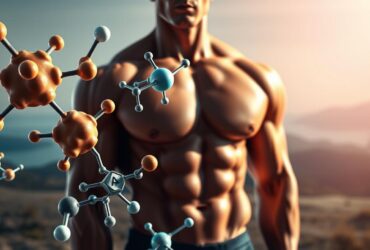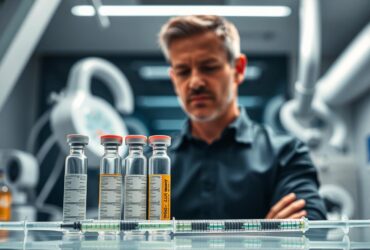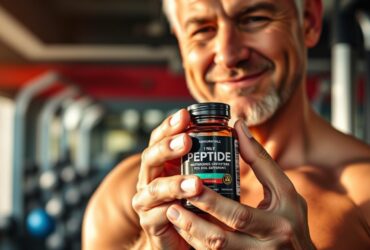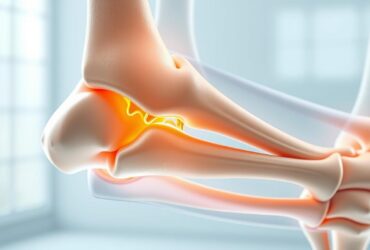As men age, maintaining optimal testosterone levels becomes increasingly important for both health and appearance. For men over 40, natural methods to support testosterone levels are often preferred. Enter peptides, short chains of amino acids that act as signaling molecules in the body. These natural compounds can stimulate the production of essential hormones, including growth hormone, which plays a crucial role in muscle growth and overall vitality.
Peptides work by signaling the body to produce these hormones naturally, making them a safe and effective option. By supporting testosterone levels, peptides can enhance muscle growth, improve energy levels, and promote a more youthful appearance. This approach not only benefits physical health but also contributes to improved sexual health, which is vital for confidence and overall well-being.
Dr. John Spencer Ellis on Diet Guru offers personalized guidance to help men over 40 optimize their health and appearance. In this guide, we’ll explore the science behind peptides, their effects on the body, and how to use them safely for the best results. Whether you’re looking to improve muscle growth or simply feel more vibrant, peptides offer a natural solution worth considering.
Key Takeaways
- Peptides are short chains of amino acids that signal the body to produce essential hormones naturally.
- They can help increase testosterone levels in men over 40, supporting muscle growth and vitality.
- Peptides work as signaling molecules to stimulate hormone production, including growth hormone.
- Natural methods to support testosterone levels are often preferred for their safety and effectiveness.
- Dr. John Spencer Ellis on Diet Guru offers personalized guidance for optimal health and appearance.
Introduction: Why Testosterone Decline Matters After 40
Understanding the significance of testosterone decline after 40 is crucial for maintaining both health and appearance. As men age, the body’s ability to produce this essential hormone diminishes, leading to a cascade of changes that affect overall well-being. This natural process can impact everything from energy levels to physical appearance, making it a critical health issue for men entering middle age.
The Impact on Health and Appearance
Declining testosterone levels can have far-reaching effects on a man’s health and appearance. One of the most noticeable impacts is the loss of muscle mass and tone, which can lead to a reduction in strength and vitality. Additionally, lower testosterone levels can result in increased body fat, particularly around the midsection, which not only affects appearance but also increases the risk of chronic health conditions like diabetes and cardiovascular disease.
Testosterone also plays a key role in maintaining bone density. As levels drop, men may experience a higher risk of osteoporosis and fractures. Furthermore, skin health can deteriorate, leading to a loss of elasticity and the appearance of aging. These changes can significantly affect a man’s self-esteem and overall quality of life.
Early Warning Signs and Lifestyle Effects
Recognizing the early signs of low testosterone is essential for taking proactive steps to address the issue. Common symptoms include persistent fatigue, decreased libido, and difficulty concentrating. These symptoms can often be mistaken for normal aging, but they may indicate a more significant hormonal imbalance that requires attention.
Lifestyle factors can exacerbate the effects of declining testosterone. Poor diet, lack of exercise, and chronic stress can all contribute to lower hormone levels. Additionally, certain medical conditions, such as obesity or sleep apnea, can further reduce testosterone production. Addressing these lifestyle factors through diet, exercise, and stress management can help mitigate the effects of declining testosterone.
For men seeking to optimize their health and appearance, expert guidance is available. Dr. John Spencer Ellis on Diet Guru offers personalized plans to help men over 40 achieve their health goals. By combining lifestyle changes with natural solutions like peptide therapy, men can effectively address testosterone decline and regain their vitality.
Early detection and intervention are key to managing the effects of testosterone decline. By understanding the signs and taking proactive steps, men can maintain their health and appearance well into their 40s and beyond. For more information on testosterone replacement therapy and how it can help, visit this expert guide.
Understanding Peptides and Their Role in the Body
Peptides are short chains of amino acids, acting as essential signaling molecules in the body. They play a crucial role in various bodily functions, including hormone production and tissue repair. Found naturally in foods like eggs, beans, soy, and oats, peptides are vital for maintaining overall health and supporting cellular processes.
What Are Peptides?
Peptides are composed of amino acids, the building blocks of proteins. Unlike full proteins, peptides are shorter chains, making them easier to absorb and utilize by the body. This unique structure allows peptides to function as signaling molecules, facilitating communication between different cells and tissues. Through this signaling, peptides can stimulate the production of essential hormones, including those that support muscle growth and vitality.
Natural Sources and Dietary Importance
Natural peptide sources are abundant in everyday foods. Eggs, beans, soy, and oats are excellent examples, providing essential amino acids that the body can convert into peptides. These dietary peptides support overall health by aiding in cellular repair and maintaining tissue integrity. They also play a role in regulating various bodily functions, from immune response to hormonal balance.
| Food Source | Key Peptides | Health Benefits |
|---|---|---|
| Eggs | Lysozyme, Ovotransferrin | Immune support, antioxidant properties |
| Beans | Phaseolus vulgaris | Aids digestion, supports gut health |
| Soy | Genistein, Daidzein | Antioxidant, may support bone health |
| Oats | Avenanthramides | Anti-inflammatory properties |
As part of a holistic approach, incorporating these peptide-rich foods into your diet can enhance overall wellness. Peptide therapy, guided by experts like Dr. John Spencer Ellis on Diet Guru, can further support body health by targeting specific areas such as cellular repair and hormone balance.
The Science Behind Testosterone Decline in Men Over 40
The natural aging process in men over 40 triggers a series of complex physiological changes that affect hormone production. These changes are part of a gradual process that impacts overall health and well-being.
Hormonal Shifts with Aging
As men age, the body’s ability to produce essential hormones, including testosterone, diminishes. This decline is linked to reduced protein synthesis and altered function of hormonal pathways. Studies indicate that these changes contribute to lower testosterone levels, which can affect muscle maintenance and vitality.
Amino acids play a crucial role in this process, as they are the building blocks of proteins necessary for hormone production. The function of these amino acids and proteins becomes less efficient with age, further impacting testosterone levels.
Common Symptoms of Low Testosterone
Recognizing the symptoms of low testosterone is essential for early intervention. Common signs include loss of muscle mass, persistent fatigue, and changes in mood. These symptoms can significantly affect a man’s quality of life and overall health.
Understanding the scientific changes behind testosterone decline offers significant benefits. It allows for informed treatment strategies, potentially incorporating natural solutions like peptide therapy to counteract these effects. By addressing these changes, men can better maintain their health and vitality.
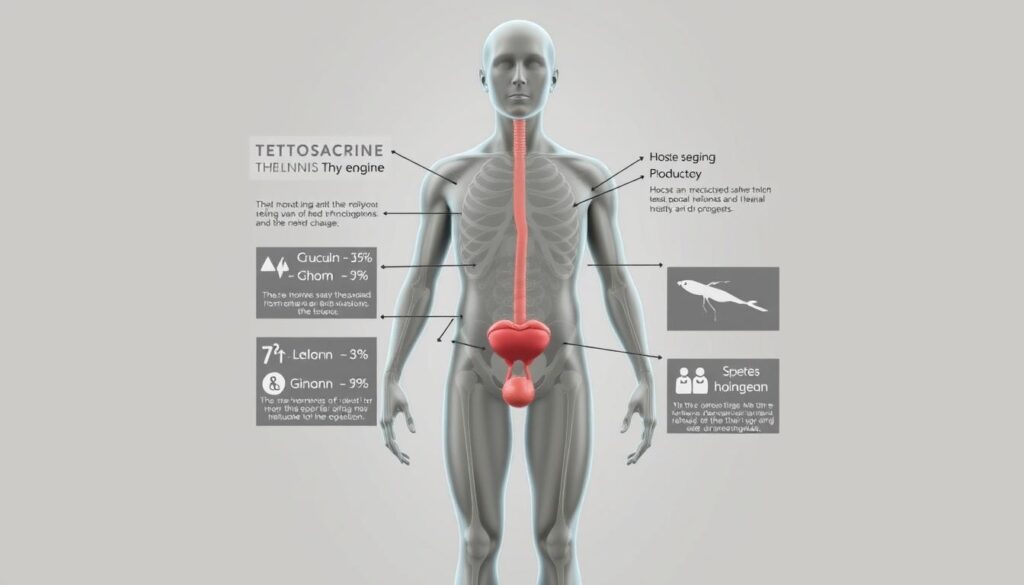
How Peptides Work to Boost Natural Hormone Production
Peptides play a pivotal role in enhancing natural hormone production by interacting with cellular repair mechanisms, making them a valuable tool for men over 40. These short chains of amino acids bind to specific receptors in cells, triggering repair processes that restore muscle tissue and enhance energy levels.
MECHANISM OF ACTION IN CELLULAR REPAIR
At the cellular level, peptides initiate repair and regeneration by binding to receptors, which activates pathways responsible for tissue restoration. This process not only repairs damaged cells but also strengthens muscle integrity, countering the natural loss of muscle mass that comes with aging.
BENEFITS FOR MUSCLE GROWTH AND ENERGY
The interaction of peptides with cellular repair mechanisms offers multiple benefits:
- Rebuilding muscle tissue through chain amino acids, which are essential for muscle repair and growth.
- Reducing muscle loss during aging, helping maintain strength and vitality.
- Enhancing cellular energy production, leading to increased stamina and overall energy levels.
- Working in harmony with the body’s natural repair processes, ensuring a safe and effective approach to hormone support.
By understanding how peptides function at a cellular level, men can harness their potential to support muscle growth and energy, leading to a more vibrant and active lifestyle.
Peptides for Testosterone Boost: A Natural Approach
Harnessing the power of peptides offers a natural solution for men over 40 seeking to optimize their hormone levels. These short chains of amino acids function as signaling molecules, targeting specific cells to stimulate hormone production naturally.
Optimizing Hormone Levels with Targeted Therapy
Peptides’ ability to bind to specific receptors allows them to enhance cellular repair and regeneration, countering the effects of aging on tissue health. This targeted approach supports the body’s natural processes, avoiding the risks associated with synthetic methods.
As men age, the body’s ability to maintain tissue integrity diminishes. Peptides step in by targeting damaged cells, promoting regeneration and preserving youthful vitality. Their natural synergy with the body’s systems makes them a safer, more effective choice compared to synthetic hormones.
Each individual’s needs are unique, and peptides can be tailored to provide personalized treatment. This adaptability ensures that the therapy addresses specific hormonal imbalances, offering a customized approach to health.
For men seeking a natural and effective way to restore hormone balance, peptide therapy is a promising option. Consulting with experts like Dr. John Spencer Ellis on Diet Guru ensures a safe and personalized approach to treatment. With peptide therapy, men can reclaim their vitality and confidence, embracing a healthier, more energetic lifestyle.
Expert Guidance from Dr. John Spencer Ellis on Diet Guru
Dr. John Spencer Ellis, a renowned expert in wellness and nutrition, offers personalized guidance to help men over 40 achieve optimal health and appearance through tailored treatment plans. His approach combines cutting-edge peptide therapy with holistic health strategies, ensuring a comprehensive path to vitality.
Personalized Health and Treatment Plans
Each treatment plan is carefully designed to integrate peptide therapy with regular workouts, creating a balanced approach to health. This combination not only supports muscle growth but also enhances overall energy levels, making it easier to maintain an active lifestyle.
Peptide therapy serves as a building block for overall health enhancement. By targeting specific cells, it promotes cellular repair and regeneration, which are crucial for maintaining muscle strength and vitality as men age. This approach ensures that the body’s natural processes are supported, leading to a safer and more effective method of hormone support.
Dr. John Spencer Ellis emphasizes that each treatment plan is unique, tailored to address individual needs. Whether the goal is to optimize hormone levels or improve muscle strength, the plans are designed to deliver personalized results. The integration of expert advice with advanced peptide protocols ensures a well-rounded approach to health, addressing both physical and hormonal aspects.
The role of peptide therapy in maintaining lasting muscle health cannot be overstated. By supporting the body’s natural repair mechanisms, it helps preserve muscle integrity and function. This makes it an essential component of any comprehensive health plan for men over 40 seeking to maintain their strength and vitality.
For those looking to embark on their wellness journey, seeking personalized advice on Diet Guru is a crucial step. With Dr. John Spencer Ellis’s expertise, men can explore customized solutions that fit their unique needs, ensuring a path to optimal health and appearance.

Integrating Peptide Therapy into Your Fitness Routine
Combining peptide supplements with a well-structured fitness regimen can create a powerful synergy that enhances workout results and overall vitality. This approach not only supports muscle growth but also aids in recovery, making it a holistic method for men over 40 seeking to maintain peak physical condition.
Combining Exercise with Peptide Support
Exercise and peptide supplements work hand-in-hand to amplify the benefits of each. When you engage in regular physical activity, your body naturally produces human growth hormone (HGH), which peptides can further enhance. This dual approach supports muscle recovery and growth, helping you achieve your fitness goals more efficiently.
Nutrition and Supplement Synergy
Nutrition plays a crucial role in maximizing the effects of peptide supplements. A balanced diet rich in essential nutrients complements the action of peptides, ensuring your body has the necessary building blocks for optimal performance and recovery. Additionally, maintaining a healthy diet helps minimize potential side effects and supports overall well-being.
By integrating peptide therapy into your fitness routine, you can experience enhanced recovery, enhanced muscle development, and improved vitality. Always consult with a healthcare professional to ensure safe and effective use of supplements.
Safety, Dosage, and Managing Potential Side Effects
Safety and proper dosing are paramount when considering peptide therapy for men over 40. Ensuring that these aspects are prioritized can help maximize the benefits while minimizing potential risks. This section delves into the essential guidelines for safe use, potential side effects, and the role of professional oversight in peptide therapy.
Understanding Risks and FDA Guidelines
Peptide therapy is generally considered safe when administered under medical supervision. The FDA provides clear guidelines on dosage and potential side effects, emphasizing the importance of adhering to recommended protocols. For men seeking to maintain muscle mass and overall health, following these guidelines is crucial to avoid adverse effects and ensure the therapy remains effective.
Best Practices for Safe Use
To integrate peptide therapy safely into your daily routine, consider the following best practices:
- Always follow FDA guidelines for peptide therapy to protect muscle mass and overall health.
- Consult with a healthcare professional to determine the appropriate dosage and monitoring protocols.
- Be aware of potential side effects and take practical steps to mitigate them.
- Understand that professional oversight can ensure the therapy is both safe and effective.
| Aspect | Recommendations | Benefits |
|---|---|---|
| Dosage | Adhere to FDA guidelines and medical advice | Optimizes human growth hormone production |
| Monitoring | Regular check-ups and blood tests | Ensures therapy effectiveness and safety |
| Side Effects | Address any concerns promptly | Minimizes risks and enhances well-being |
Proper dosing has a positive effect on human growth hormone production, which is essential for maintaining muscle mass and vitality. By following these best practices, men can safely integrate peptide therapy into their routines, supporting their overall health and appearance. For personalized advice, visit this expert guide to explore tailored solutions.
Conclusion
In conclusion, peptide therapy emerges as a powerful, natural solution for men over 40 seeking to maintain youthful vitality and appearance. By supporting testosterone levels and promoting collagen health, peptides play a vital role in combating the visible effects of aging. Their ability to enhance muscle strength, energy, and overall well-being makes them a cornerstone of modern, science-backed health strategies.
Safe treatment practices and expert supervision are paramount. Dr. John Spencer Ellis on Diet Guru offers personalized guidance, ensuring that peptide therapy is both effective and tailored to individual needs. This approach not only addresses hormonal balance but also supports skin health, countering the effects of inflammation and promoting a more vibrant appearance.
For those ready to take control of their health, consulting with Dr. John Spencer Ellis is a crucial step. His expertise provides a clear path to optimizing hormone levels and embracing a holistic lifestyle. Remember, informed and personalized treatment is the key to long-term wellness and confidence.
Learn more about how to combat inflammation and maintain a youthful look by visiting this expert guide. Embrace a science-backed approach to health and rediscover your vitality today.




